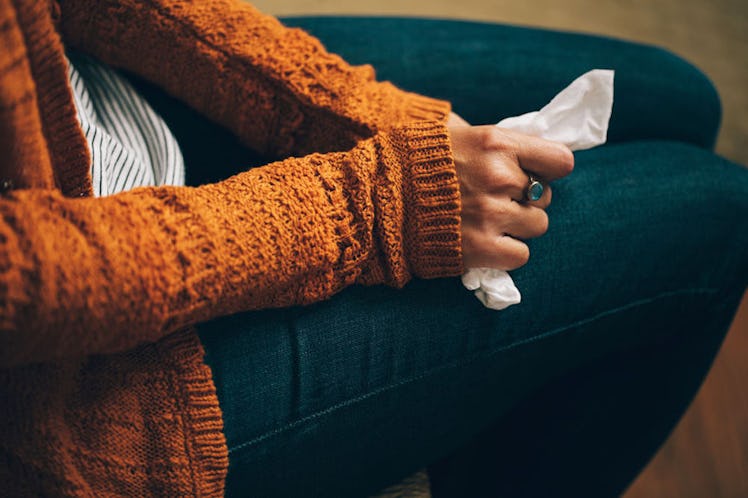
Here's What You Need To Know If You're Worried That The Flu Shot Will Make You Sick
You've probably already heard a million people nag you to get a flu shot —your mom, your doctor, one of those scary ads they've been putting in subway stations. But even if you've held out against all of that advice, here's one less reason for you not to get vaccinated: If "the flu shot could make me sick" has always been your reason for skipping your annual vaccine, I have bad news for you. As far as experts on the subject are concerned, you shouldn't put off getting your flu shot for even one more week, because scientifically speaking, the flu shot definitely won't give you the flu.
According to Dr. Celine Thum, medical director of Paradocs Worldwide Inc., any concerns you have that getting the flu vaccine will actually give you the flu, are just not true. "The flu shot has either an inactive or attenuated virus and cannot cause the flu," she tells Elite Daily in an email.
As you might have heard, introducing the vaccine to your body can teach your body to fight the actual flu, but that doesn't mean you're putting a dangerous virus into your body. "Like any vaccination we give to protect someone from an illness, the vaccine components stimulate your body's immune system to produce antibodies against the components of the agent in the vaccine," explains Dr. Roger Lovell, an infectious disease specialist at Piedmont Athens Regional Medical Center. "That immune response can cause symptoms, but the flu vaccine cannot actually cause flu infection," he tells Elite Daily over email.
If you've had the flu shot before and you started getting sick afterward, it's totally understandable that you might be wary. But according to Dr. Lovell, flu vaccine side effects are not only not the flu, but they're incredibly minor compared to the risk of getting the virus itself. "The stimulation of the immune response by the vaccine can cause arm pain, arm swelling, arm redness. It can also cause a low-grade fever and body (muscle and joints) aches," he explains. But any negative reactions your body might have to the shot should pass very quickly, he says. According to Dr. Lovell, you should feel like your normal self again in less than two days following the flu shot.
While flu vaccination effectiveness rates vary each year, the flu vaccine remains the best way to prevent the illness and its serious complications, says Dr. Lovell. "Data from the 2016-17 flu season reveals that the flu vaccine prevented more than five million flu illnesses, more than two million medical visits, and 85,000 hospitalizations."
But even if your flu shot isn't 100 percent effective, and you manage to get the flu anyway, Dr. Thum says it would still be much more manageable than what you would experience without being vaccinated. According to the medical director, even if it doesn't prevent you from getting sick, "[the vaccine] decreases the severity of the flu, the duration of your symptoms, and decreases your risk of requiring hospitalization."
And why, exactly, would you still be vulnerable to the flu if you've been vaccinated? Dr. Norman Moore, the director of scientific affairs and infectious disease at Abbott, tells Elite Daily that there are some educated projections that go into the development of the vaccine. "The strains that go into the flu vaccine are chosen almost a year in advance of flu season based on the scientific community’s best guess as to what viruses are most likely to be circulating," he explains. "This is one of the reasons why vaccine effectiveness can vary from year to year."
But even though there's always the slim chance that you'll contract a different flu strain than the one the vaccine is designed to protect you from, this shouldn't be a reason to not get the shot at all, says Dr. Moore. "As we know, people do die from influenza every year and now we are seeing a rise in other conditions like whooping cough and measles," he tells Elite Daily. Plus, he adds, getting vaccinated doesn't only protect you, but also those around you.
If you still don't know whether you can stomach the actual act of getting a shot (I'm right there with you on hating needles), you might want to ask your doctor about trying the nasal spray version of the flu vaccine instead, which the Centers for Disease Control and Prevention (CDC) confirms is available for the 2018-2019 flu season. Just be extra careful if you have asthma, or already have another medical condition that might affect how your body reacts to the mist, says the CDC.
Bottom line: Take a tip from Nike and "just do it," girl. You really have nothing to lose, and everything to gain in protecting your body and your community.
This article was originally published on